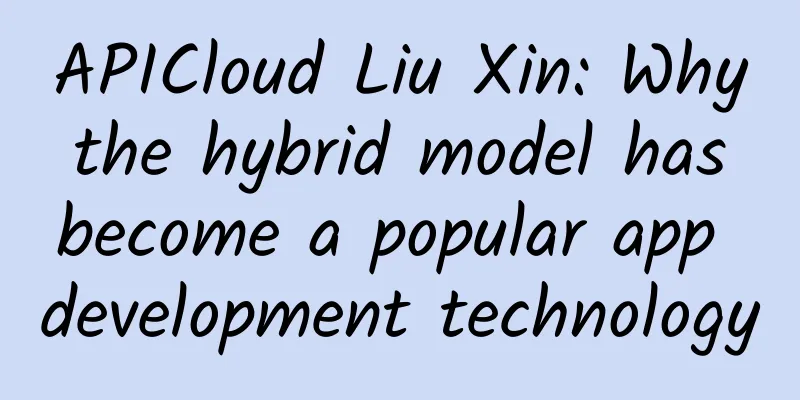APICloud Liu Xin: Why the hybrid model has become a popular app development technology

|
In the strategic layout of enterprise mobility, apps have become the most important carrier for connecting businesses and users. Similarly, their development technology is currently at a very mature stage. However, from the perspective of technical implementation, many practitioners may not know that the larger the enterprise and the more IT budget the enterprise has, the more their mobile apps are implemented based on a hybrid development model. In particular, for B2B, B2C and B2E mobile applications developed with hybrid app technology, the proportion is even much higher than market expectations and imagination. At present, leading companies in major banks, insurance companies, tobacco, electricity, aviation, railways, home appliance manufacturing, food, retail and other industries all use hybrid development models to develop and manage their own apps. So many people may ask, "Why do these companies and enterprises, which have sufficient budgets and development resources, choose hybrid app development technology as the support for enterprise Internetization?" In the impression of most people in the industry, there is still a gap between hybrid development technology and native development technology in terms of user experience and product capabilities. In response to this industry doubt, APICloud founder and CEO Liu Xin, as a senior practitioner who has been engaged in the mobile application industry for many years, analyzed this prominent phenomenon in the industry in an easy-to-understand manner through his rich industry experience and in-depth exposure to the needs of corporate mobile strategic layout. The answer is most directly related to the company's needs for Internet and digitalization, which also reflects why Liu Xin chose hybrid development technology to provide services to platform users when he founded the APICloud platform. This article will explain why many companies choose hybrid app development technology through Mr. Liu Xin’s four-faceted analysis. The conclusion also reveals the fundamental advantages of the hybrid app model represented by APICloud for solutions in different industries and the necessity for companies to choose it. ***、Demand for the speed of digital advancement The Internet term "trial and error" has not only spread among Internet companies, but has also been widely accepted in the process of traditional companies' Internetization. When talking about their respective enterprise mobile strategies, more and more CIOs will mention "Can we make a prototype of an idea of our business department within a week, implement it quickly, throw it out to test user feedback, and then make changes based on this prototype?" This method of rapid initiation, rapid verification, and rapid adjustment has become a widely popular method. The reason why the business idea must be turned into reality in a short period of time is that the innovative ideas of the business may have no precedents to follow and have a clear corporate personality. It is difficult to think of them completely simply out of thin air. Instead of spending three to five months to fine-tune and figure out the business needs, it is better to spend one or two weeks to implement the basic ideas first, so that the business ideas can become "evidence-based" and "targeted" in the process, thereby realizing a more complete and more feasible business plan. "IT can come up with an idea from the business department in one or two weeks." This is also a very important compliment for the person in charge of information technology of the enterprise. And this speed demand is precisely the most obvious advantage of the hybrid development technology of the APICloud platform. A set of code can generate apps for both iOS and Android platforms simultaneously, and can even be partially compatible with WeChat public accounts and mini-programs. This set of code does not mean laziness or simplification of engineering technology, but it greatly saves the time of code writing and solves the problem of cross-knowledge structure collaboration between multiple technical teams. It no longer requires iOS and Android engineers to hold meetings to discuss the differences in implementation, and it greatly saves the time cost of joint debugging and testing of apps and servers. In order to meet the requirements of CIOs for business development and digital efficiency, in the enterprise mobile strategy, cross-platform hybrid mode app development is often planned as the support basis of the mobile strategy. The customized app development service provided by APICloud for enterprises not only has the advantages of the hybrid development model, but also has been rated as a Cool Vendor in China by the authoritative IT research and consulting agency Gartner with its innovative development technology and solid project experience, and has become the recommended choice for global enterprise customers to deploy mobile strategies. Second, the need for business flexibility In the B/S architecture of the PC era, if you want to update the IT system, you don’t need to consider the impact on the user end too much. Because the browser, as the user’s portal, is always in a state of accessing the network. As long as the network is connected, users can access the website at any time to obtain the latest functions and services. For users, the concept of version does not really exist. As long as they access the server, any updates to the server can be displayed on the user interface at any time. If there are any user problems, they can basically be solved by "clearing the browser cookies once". However, in the mobile era, users have become extremely sensitive to the concept of versions. App version management has also become a headache for CIOs. Often due to the limitations of software developers' capabilities, or in other words, all engineering problems will have bugs, making some released apps difficult to use or even crash. Some temporary marketing activities, low-usage but important functions, and unplanned product demand adjustments will directly lead to the same problem: "Users must update a version or even re-download it to meet the above needs." This seemingly daily version release and user update is precisely a brand new topic in the process of traditional enterprise informatization. "Can we always open the latest services and functions like traditional browsers?" Many corporate CIOs asked the same question, so a large number of third-rate software service providers and IT programmers came up with a "lazy" model. They embedded some WebViews in the app and used the traditional web page model to access the server and obtain some functions dynamically. This apparently solved the problem of version updates, but in fact, a large number of apps with poor experience were produced. The essence of the enterprise's business flexibility requirement is to release new features at any time, dynamically add and modify some function entrances at any time, and let users use them at will, just like WeChat Mini Programs. However, the user experience should be the same as that of a real app. This demand for business flexibility actually requires the support of hybrid app development technologies such as WeChat Mini Programs or APICloud, so as to achieve "incremental updates", "silent updates", and "new features and new experiences", rather than nesting Webview and web page simulation apps, which trades the feasibility of business flexibility at the cost of a garbage experience. Of course, apps developed in traditional models, especially Android apps, have also begun to partially support dynamic updates, which just shows that business flexibility is a rigid demand in the process of enterprise Internetization and digitalization. However, due to the constraints of traditional technology and the limited capabilities of software development teams or service providers, real native dynamic updates have never been able to enter enterprises for commercial use on a large scale. This has also led enterprises to choose a hybrid development model to support mobile strategies, which has gradually become the mainstream option for CIOs. Third, the need for centralized management The Internet awareness of business departments has been widely promoted by the popularization of mobile Internet. Therefore, the development trend of traditional IT-led enterprise informatization has undergone subtle changes. In the past, IT departments initiated almost all informatization needs, but now IT departments are becoming more and more like "service departments". Because business teams are constantly initiating various "business + Internet" informatization needs. At this time, many traditional enterprise IT leaders have not realized the change of their roles. If they continue to "delay" and "do it yourself" such bureaucratic practices, it will lead to the situation that many enterprises' informatization today are "completely fragmented in various mobile apps" and business departments find software developers to meet their needs. This not only undermines the IT department's dominant position in informatization, but also makes subsequent centralized management extremely difficult. Dozens or even hundreds of services with different standards are mixed in the core system of the enterprise, and even business departments have partially separated from the traditional PC core system dominated by IT in order to quickly meet their own needs. This is a very dangerous signal. If the IT department is to manage how the business department meets the business's Internet needs, it often finds that it has the will but not the ability. If it does not take care of it, the fragmentation problem of "technology stack and developer" mentioned above will occur. At this time, the mobile application platform based on hybrid mode app development technology has well solved the contradiction between the two. "Setting standards" enables "centralized management". Enterprises use a unified set of hybrid app development technology and mobile platforms as standards, and each business department can independently find its own software developer. For example, in the IT informationization of many large enterprises, APICloud will be used to customize and develop mobile applications for enterprises to meet their own mobile business construction, so that both the technology selection and enterprise mobility needs are met. And try to give the same platform to bring about standardized unification, which includes "technical standardization", "development process standardization", "code management standardization", "project management standardization", "acceptance standardization", "management and operation standardization" and other standardized systems. Fourth, the need for information security The most fundamental transformation accompanying the Internetization of enterprises is the transformation from the informatization of the intranet to the Internetization of the extranet; traditional informatization includes the intranet, fixed location, fixed network environment, and fixed equipment, while the Internetization of enterprises under the background of mobile strategy means that the extranet can be accessed anytime and anywhere through employees' own equipment. These inconspicuous changes have brought about earth-shaking adjustments for enterprise CIOs. At first, MDM (mobile devices management) software was popular for a while, but almost all companies that bought MDM found it difficult to promote it, because MDM is accompanied by BYOD (bring your own device). If the company's management software is used to manage employees' own devices, no one will support this proposal. Therefore, most MDMs ended up in a mess, and only managed some mobile devices purchased by the company. So how do we ensure the security of mobile and Internet-based enterprises? This requires meeting the security requirements at three levels: device security, traditional security, and cloud security. Hybrid mode apps can implement a dynamic permission binding and authorization model similar to enterprise application stores (WeChat public accounts), and can support the selection of different sub-applications between specific devices and specific people. In addition, new sub-applications can be dynamically allocated in real time based on device codes and user permissions as the user's work content is adjusted. This "sub-application" model based on the enterprise mobile application store is also the key to hybrid mode app development technology becoming the support for enterprise mobile strategy. Therefore, an excellent enterprise application store can give play to the various security needs and satisfaction of enterprises that apps developed in traditional native modes cannot give, while also achieving the management purpose of business flexibility. Based on the above problems that frequently occur in the layout of enterprise mobile Internet, hybrid mode app development technology has been popularized through its own advantages of efficiency and flexibility, and has become the mainstream choice of enterprise CTOs and CIOs. The enterprise mobile strategic services provided by APICloud can better help enterprise business to realize scenario implementation. Currently, more than 800,000 applications have been created on the APICloud platform, and its customers include Intel, Haier, ZTE, SAIC Group, Country Garden, CITIC Group and many other well-known domestic companies. Its business capabilities cover IoT, online education, live broadcast, O2O, enterprise office management, e-commerce and other fields, and it was the first to propose the service concept of "guaranteed online", providing enterprises with customized services that are worry-free, safe and reliable. |
<<: WeChat launches new feature "Friends Message", but 60% of users say they don't like it
>>: A large wave of Android notch screens is coming, and the whole network is fully adapted!
Recommend
This more than 100-meter-deep ice cave can make the sun "dance" and also hides geological "codes"
Author: Duan Yuechu and Huang Xianghong Image fro...
Morgan Stanley: India will become Apple's next China
China's economic growth, the increase in the ...
What! Soba noodles are unhealthy? The truth is...
Myth: “Buckwheat noodles are unhealthy” In recent...
iPhone automatic shutdown tracking: the reason is unknown, customer service said wearing a protective case can keep warm
Recently, many iPhone users have reported that th...
A brief history of operations: 20 years of development and evolution of Internet operations (continued)
(Continued from the previous article) 2009-2013: ...
Programmer career change: Lightspeed entry product manager (product manager course worth 6999)
Resource introduction of the programmer-turned-ca...
LCD panel prices are about to fall for the first time? Domestic screens are poised to overtake other brands
The price hike of LCD panels has not stopped, and...
Private domain build logic from 0 to 1
This article is based on mutual learning and rese...
Three questions about users: Who are the users? Where do users come from? What does the user want to do?
There are three ultimate questions in philosophy:...
Tencent Operation Strategy: How to better understand users’ product operations?
Early stage of operation : quickly familiarize yo...
Learn React in a simple way and master the knowledge links and underlying logic of React
Learn React in a simple and easy way, and master t...
Research finds: Eating wheat germ polysaccharides can help prevent aging! Only this kind of food contains →
Speaking of maltose, everyone is familiar with it...
A brand marketing program operation manual
This is a brand marketing operation manual that I...
iOS 15 supported models announced, this generation of classic iPhone will eventually retire
According to foreign media 9to5Mac, the well-know...
Understanding Russian History in One Breath (3)
Mixed Knowledge Specially designed to cure confus...









